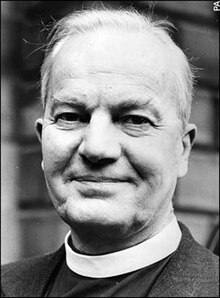Thomas F. Torrance | |
|---|---|
 | |
| Born | Thomas Forsyth Torrance 30 August 1913 |
| Died | 2 December 2007 (aged 94) Edinburgh, Scotland |
| Spouse |
Margaret Spear (m. 1946) |
| Children | 3 |
| Father | Thomas Torrance |
| Relatives |
|
| Academic background | |
| Alma mater | |
| Academic work | |
| Discipline | Theology |
| Influenced | Andrew Purves |
Thomas Forsyth Torrance MBE FRSE FBA (30 August 1913 – 2 December 2007), commonly referred to as T. F. Torrance, was a Scottish Protestant theologian and Presbyterian minister. He was a member of the famed Torrance family of theologians. Torrance served for 27 years as professor of Christian dogmatics at New College, in the University of Edinburgh. He is best known for his pioneering work in the study of science and theology, but he is equally respected for his work in systematic theology.
In addition to writing many of his own books and articles, he also edited the translation of several hundred theological writings into English, including the thirteen-volume, six-million-word Church Dogmatics of Swiss theologian Karl Barth, as well as John Calvin's New Testament Commentaries.
Torrance has been acknowledged as one of the most significant English-speaking theologians of the 20th century. In 1978, he received the Templeton Foundation Prize for Progress in Religion.[1] Torrance remained a dedicated churchman throughout his life, serving as an ordained minister in the Church of Scotland. He was instrumental in the development of the historic agreement between the World Alliance of Reformed Churches and the Eastern Orthodox Church churches on the doctrine of the Trinity, who released a joint statement of agreement on 13 March 1991.[2]
After retiring from the University of Edinburgh in 1979, he continued to lecture and to publish extensively, including several influential books on the Trinity: The Trinitarian Faith: The Evangelical Theology of the Ancient Catholic Church (1988); Trinitarian Perspectives: Toward Doctrinal Agreement (1994); and The Christian Doctrine of God, One Being Three Persons (1996).
- ^ "The Templeton Prize – Previous Winners". Templetonprize.org. Retrieved 13 October 2013.
- ^ I. John Hesselink, "A Pilgrimage in the School of Christ: An Interview with Thomas F. Torrance", Reformed Review 38, no. 1 (Autumn 1984): p. 50. Torrance also served on the Reformed-Roman Catholic Study Commission on the Eucharist in Woudschoten, Holland (1974). Also see, Thomas F. Torrance, ed., Theological Dialogue Between Orthodox and Reformed Churches, p. 199